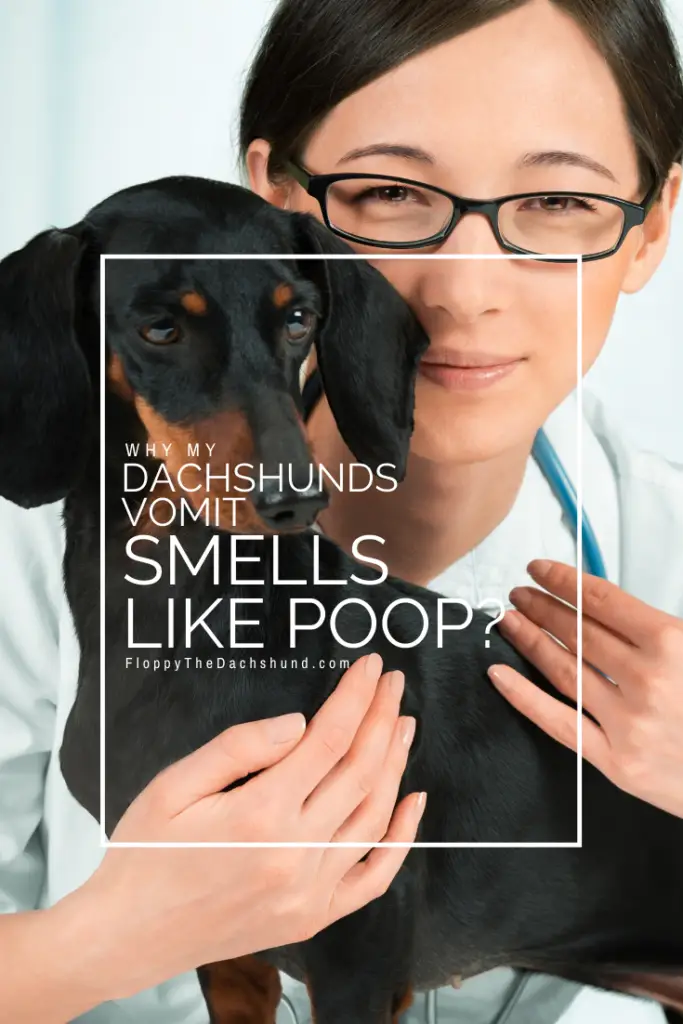Some dog owners stop being vigilant about what their puppy puts in his mouth once he’s reached a certain age. However, vigilance is best as all dogs, young or older, are at risk for intestinal obstruction. Furthermore, if your dog vomits and it smells like poop, he may have a serious, even life-threatening condition. It is likely that what you smell is feces, the result of a blockage that is not able to pass on its own.

Common Causes Of Intestinal Blockage
The major cause behind this is an obstruction or severe trauma to the lower gastrointestinal tract. The sharper or larger the obstruction is, the more serious the risk faced by your dachshund, risk of rupture, perforation, and peritonitis.
Veterinarians have removed a wide range of objects from the guts of dogs, like coins, marbles, hearing aids, batteries, bones, socks and a large number of other objects.
Signs and Symptoms
Generally, symptoms appear within seven hours after the object has been ingested. However, in some cases, it may take days before the owner notices a problem. General warning signs that indicate that something is wrong are: intermittent vomiting, diarrhea, lack of appetite, dehydration, weakness, lethargy, bleeding, or shock. Owners sometimes get a false feeling that the obstruction has passed when their dog has diarrhea. However, you should not be fooled as diarrhea can work itself around a blockage. The general rule is that an upper gastrointestinal obstruction results in projectile vomiting, whereas a lower gastrointestinal obstruction results in a distended abdomen and vomit that smells like poop.
Intestinal strangulation, however, blocks the flow of oxygen and blood, which can result in gangrene of the intestine and this can take place within a matter of hours.
Diagnosis
The sooner the dog has been examined and the object has been removed, the sooner the process of recovery can start. A veterinarian will examine the dog by palpating the abdominal area to check for tenderness and distention. An x-ray can also be used for identifying the item and for locating the blockage. Depending on the severity of the obstruction, or if there are certain other factors that complicate the situation, like rupture, perforation or necrosis, most dogs generally recover quickly.

What Diseases Can I Catch From My Dog?
A number of studies have revealed the benefits associated with dog ownership. Not only do dogs provide comfort and companionship to their owners, a number of studies have shown that dogs promote relaxation and decreased stress. Dogs also have a positive impact on nearly all life stages. They have an impact on emotional, social and cognitive development among children. They promote an active lifestyle and are even capable of detecting oncoming epileptic seizures and certain types of cancers. However, despite the presence of these positive benefits of dog ownership, dogs do carry germs that can make people sick.
Although it is very rare for germs to spread from dogs to people, contact can result in a wide range of illnesses, including minor skin infections to serious diseases. In order to protect yourself and your family, seek routine veterinary care for your dog. Always wash your hands and the hands of your children after coming into contact with dogs, their food or their stool. With the help of regular veterinary care and by following some simple health tips, you can decrease the chances of becoming sick from your dog.
When we see a dog going through a bout of diarrhea or the sniffles, we will probably wonder if we, too, are at the risk of becoming ill. The answer to this question is yes. There are several diseases that dog owners can contract from their dog. These are known as zoonotic diseases. The term ‘zoonotic’ is used for designating any disease that has been transferred from animals to humans. The widely known and the most feared example of the zoonotic diseases is rabies. Some of the other zoonotic diseases among dogs are as follows:
- Cryptosporidium infection
- Campylobacter infection
- Leptospirosis
- Salmonellosis
- Ringworm
- Giardia
Is My Dog Risky?
The good news is that even though it is possible to catch a zoonotic disease from your dog, it is not likely. However, the chances of an owner contracting a zoonotic disease do increase if the owner has a compromised immune system on account of a pre-existing disease or a medical condition, such as: pregnancy, advanced age, HIV, other chronic disease, or organ transplant.
If There Is a High Risk, Should I Give Away My Dog?
The answer is no. You simply need to be extra cautious when around your dog. A number of studies have established the myriad of benefits associated with owning a dog, particular for those suffering from a chronic illness. In fact, there are certain situations in which a doctor may actually recommend a pet for a sick patient. However, certain measures need to be taken in order to make sure that you remain safe, including the regular monitoring of your dog for any signs of illness. Basic hygienic practices also need to be followed, like washing your hands after you have handled your pet. Most importantly, avoid direct contact with your dog’s urine or feces.
Conclusion
The best way of reducing or even eliminating the risk of contracting a disease from your dog is very simple and it comes down to hygiene and common sense. You should also make sure that any illness in your dog is addressed immediately. You should not put off a routine visit to the vet if your dog isn’t showing any signs of illness. In particular, if your dog is sick, you should wash your hands after handling him.
In addition, make sure to keep your dog clean by bathing him regularly. This will also give you a chance to closely examine your dog for any signs of illness, particularly rashes or skin lesions.

